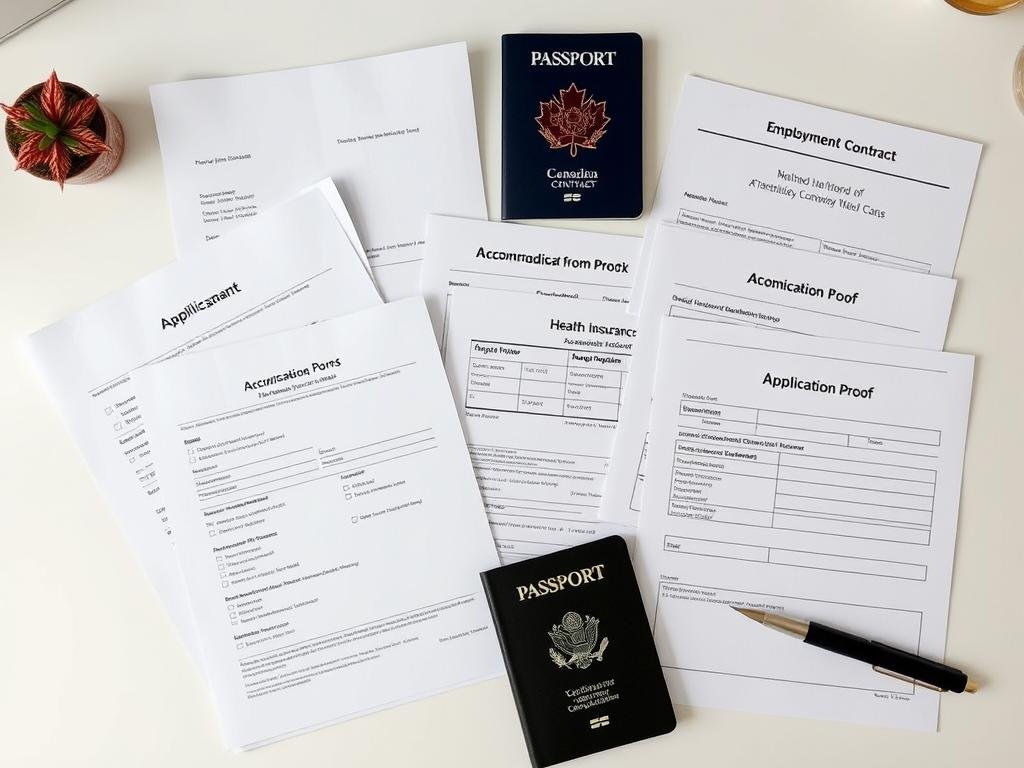The digital nomad visa Canada program represents a significant step forward in the country’s immigration policy. Launched in June 2023, this initiative allows remote workers to live and work in Canada for up to six months while maintaining employment with foreign companies. As part of Canada’s Tech Talent Strategy, this visa program aims to attract skilled professionals, particularly in the technology sector, addressing labor shortages in specialized fields while boosting the local economy. This comprehensive guide covers everything you need to know about eligibility requirements, application processes, benefits, and how to successfully navigate your journey to becoming a digital nomad in Canada.
What Is a Digital Nomad Visa Canada?
Canada’s digital nomad visa is technically not a separate visa category but rather a visitor status that allows remote workers to stay in Canada for up to six months while working for foreign employers. Unlike traditional work permits, this arrangement doesn’t require approval from Employment and Social Development Canada, making it more accessible for digital professionals seeking temporary relocation.
The program is part of Canada’s broader strategy to attract global talent, particularly in the tech industry. While many countries with digital nomad visas restrict holders from working for local companies, Canada’s approach is unique—it actually encourages visa holders to network and potentially transition to Canadian employment, offering pathways to more permanent immigration status.

Eligibility Criteria for Digital Nomad Visa Canada
To qualify for Canada’s digital nomad visa, applicants must meet several key requirements:
Essential Requirements
- Proof of remote employment with a foreign employer or evidence of self-employment/freelance work
- Sufficient financial resources to support yourself during your stay (typically demonstrated through bank statements covering the past six months)
- Valid health insurance coverage for the duration of your stay in Canada
- Clean criminal record (background check may be required)
- Valid passport with at least six months validity beyond your planned departure date
Financial Considerations
- Minimum income requirements vary but generally should demonstrate ability to support yourself without working for Canadian employers
- Bank statements showing stable income for at least 6 months
- Proof of accommodation arrangements in Canada
- Return ticket or proof of funds to purchase departure transportation
- Additional funds for emergency situations

Step-by-Step Application Process for Digital Nomad Visa Canada
Applying for Canada’s digital nomad visa involves several key steps. Follow this comprehensive guide to navigate the process successfully:
- Determine your entry requirements: Depending on your nationality, you may need either a Temporary Resident Visa (TRV) or an Electronic Travel Authorization (eTA). Check the Immigration, Refugees and Citizenship Canada (IRCC) website to confirm your requirements.
- Gather required documents: Prepare your valid passport, completed application forms, proof of employment or self-employment, financial statements, health insurance documentation, and accommodation details.
- Complete the application: Fill out the appropriate application form on the official IRCC website. For TRV applicants, use form IMM 5257. For eTA applicants, complete the online form.
- Pay application fees: The processing fee for a TRV is CAD $100, while an eTA costs CAD $7. Additional biometric fees may apply (CAD $85).
- Submit biometrics: If required, schedule an appointment at a Visa Application Centre to provide fingerprints and a photo.
- Wait for processing: Processing times vary by country of application but typically range from 1-2 months.
- Receive decision: Once approved, you’ll receive either a visa in your passport (TRV) or an electronic approval (eTA).

Need Help With Your Application?
Navigating immigration paperwork can be complex. Our experts can review your application, identify potential issues, and increase your chances of approval.
Essential Documents for Digital Nomad Visa Canada Application
| Document Type | Details | Requirements |
| Valid Passport | Primary identification document | Must be valid for at least 6 months beyond planned departure date |
| Proof of Employment | Confirmation of remote work arrangement | Employment contract, offer letter, recent pay stubs, or client contracts for freelancers |
| Financial Statements | Evidence of sufficient funds | Bank statements for the past 6 months showing stable income |
| Health Insurance | Medical coverage while in Canada | Comprehensive travel insurance policy covering the entire stay |
| Accommodation Proof | Where you’ll be staying in Canada | Hotel reservations, rental agreement, or letter of invitation |
| Return Travel | Proof of intention to leave Canada | Return ticket or proof of funds to purchase departure transportation |
| Resume/CV | Professional background | Updated resume highlighting skills and experience |

Benefits of Choosing Canada as Your Digital Nomad Destination
High Quality of Life

Canada consistently ranks among the top countries for quality of life, offering excellent healthcare, clean cities, low crime rates, and a welcoming multicultural environment that embraces diversity.
Strong Digital Infrastructure

With reliable high-speed internet throughout urban centers and many rural areas, plus abundant coworking spaces in major cities, Canada provides the perfect infrastructure for remote work.
Pathway to Permanence

Unlike many digital nomad programs, Canada’s visa can be a stepping stone to work permits and permanent residency, especially for those in tech and other in-demand fields.
Advantages of Canada for Digital Nomads
- Stunning natural landscapes and outdoor activities
- Vibrant, multicultural cities with diverse food scenes
- Political stability and strong social safety nets
- Excellent work-life balance culture
- Opportunities to network with Canadian tech companies
- No language barrier for English speakers (bilingual in Quebec)
Considerations Before Applying
- Higher cost of living in major cities like Toronto and Vancouver
- Cold winters in most regions (except coastal British Columbia)
- Six-month limitation requires planning for longer stays
- Need for private health insurance coverage
- Potential tax implications depending on length of stay
- Housing shortages in popular urban centers
Tax Implications and Residency Rules for Digital Nomads in Canada
Understanding the tax implications of working remotely from Canada is crucial for digital nomads. Here’s what you need to know:
Determining Tax Residency
Canada determines tax obligations based on residency status. If you stay in Canada for 183 days or more in a calendar year, you may be considered a tax resident and subject to Canadian taxation on your worldwide income. For shorter stays, you generally remain a non-resident for tax purposes and are only taxed on Canadian-source income.
Tax Obligations for Digital Nomads
- Non-resident digital nomads: If you maintain non-resident status (staying less than 183 days), you typically don’t pay Canadian taxes on foreign income. However, any income earned from Canadian sources would be taxable.
- Tax treaties: Canada has tax treaties with many countries to prevent double taxation. These agreements determine which country has the primary right to tax specific types of income.
- US citizens: American digital nomads must continue filing US tax returns regardless of their location, though they may qualify for the Foreign Earned Income Exclusion or Foreign Tax Credit.
Important: Tax laws are complex and vary based on individual circumstances. It’s highly recommended to consult with a tax professional familiar with both Canadian tax laws and those of your home country before beginning your digital nomad journey in Canada.

How Canada’s Digital Nomad Visa Compares to Other Countries
When considering your options as a digital nomad, it’s helpful to understand how Canada’s program compares to other popular destinations:
| Country | Duration | Income Requirement | Application Fee | Path to Residency |
| Canada | Up to 6 months | Sufficient funds (not specified) | CAD $100 (TRV) or $7 (eTA) | Yes, through work permits |
| Portugal (D7) | 1 year, renewable | €8,460/year minimum | €90 | Yes, after 5 years |
| Spain | 1 year, renewable | €2,316/month minimum | €80 | Yes, after 5 years |
| Estonia | 1 year | €3,504/month minimum | €100 | No direct path |
| Costa Rica | 1 year, renewable once | $3,000/month minimum | $100-$250 | Limited options |
Key Differentiators of Canada’s Digital Nomad Visa
- Employment flexibility: Unlike most countries that restrict digital nomads from working with local companies, Canada encourages networking with Canadian employers as a pathway to longer-term status.
- Immigration integration: Canada’s program is designed as part of a broader immigration strategy, making it easier to transition to work permits and permanent residency.
- No specific income threshold: While you must demonstrate sufficient funds, Canada doesn’t set a specific monthly income requirement like many European programs.

Best Canadian Cities for Digital Nomads
Toronto

Why choose Toronto: Canada’s largest city offers a vibrant tech scene, diverse cultural experiences, excellent public transportation, and countless networking opportunities. Average monthly expenses (excluding rent): CAD $1,500.
Vancouver

Why choose Vancouver: Mild climate, stunning natural surroundings, thriving tech industry, and exceptional quality of life make Vancouver ideal for outdoor enthusiasts. Average monthly expenses (excluding rent): CAD $1,450.
Montreal

Why choose Montreal: European charm, lower cost of living than other major cities, vibrant arts scene, and bilingual environment make Montreal unique. Average monthly expenses (excluding rent): CAD $1,350.
Frequently Asked Questions About Digital Nomad Visa Canada
Can I bring family members with me on a digital nomad visa to Canada?
Yes, family members can accompany you to Canada, but they must apply for their own visitor visas or eTAs. Spouses/partners and dependent children are eligible to come with you, though they would also be limited to visitor status unless they qualify for work or study permits through other programs.
Can I work for Canadian companies while on a digital nomad visa?
No, the digital nomad visa allows you to work remotely for foreign employers only. However, you can network and interview with Canadian companies, and if you receive a job offer, you can apply for a work permit to legally work for a Canadian employer.
How can I extend my stay beyond six months?
There are several options to extend your stay beyond the initial six months:
- Apply for a visitor record to extend your visitor status
- Apply for a work permit if you receive a job offer from a Canadian employer
- Apply for permanent residency through programs like Express Entry if you qualify
- Leave Canada and return after a period abroad (though immigration officers have discretion regarding re-entry)
Do I need to pay Canadian taxes as a digital nomad?
If you stay in Canada for less than 183 days in a calendar year and maintain stronger residential ties to another country, you’ll likely be considered a non-resident for tax purposes. Non-residents generally don’t pay Canadian taxes on foreign-source income. However, tax situations vary widely based on individual circumstances, so consulting with a tax professional is strongly recommended.
What healthcare coverage do I need as a digital nomad in Canada?
Digital nomads are not eligible for Canada’s public healthcare system and must obtain private health insurance that covers medical care in Canada for the duration of their stay. Your insurance should cover emergency medical treatment, hospitalization, and potentially repatriation. Many international travel insurance policies or specialized digital nomad insurance plans offer appropriate coverage.
Ready to Start Your Digital Nomad Journey in Canada?
Canada’s digital nomad visa offers a unique opportunity to experience life in one of the world’s most livable countries while maintaining your remote career. With its combination of natural beauty, vibrant cities, strong digital infrastructure, and potential pathways to permanent residency, Canada stands out as an excellent choice for location-independent professionals.
Whether you’re drawn to the cosmopolitan energy of Toronto, the outdoor paradise of Vancouver, or the European charm of Montreal, Canada provides the perfect backdrop for both professional productivity and personal adventure. By understanding the requirements, preparing thoroughly for your application, and planning for tax and practical considerations, you can make your Canadian digital nomad experience both successful and rewarding.
Start Your Application Process Today
Don’t miss the opportunity to live and work in Canada. Get organized with our comprehensive application checklist and increase your chances of approval.

